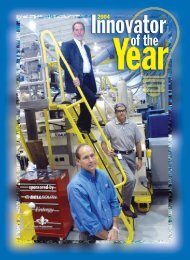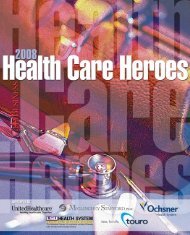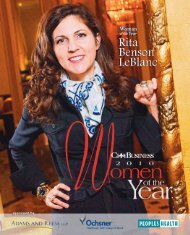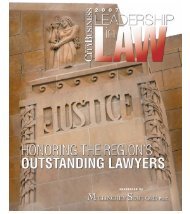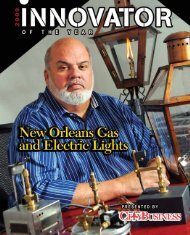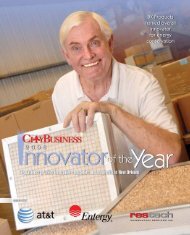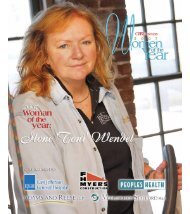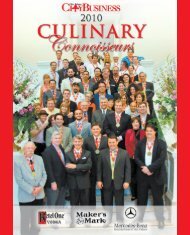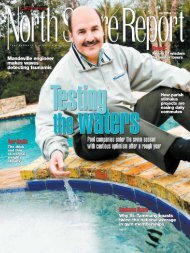We salute those who - New Orleans City Business
We salute those who - New Orleans City Business
We salute those who - New Orleans City Business
You also want an ePaper? Increase the reach of your titles
YUMPU automatically turns print PDFs into web optimized ePapers that Google loves.
PHYSICIANCarlosRodriguez-FierroPosition: medical director, Cardiology Center at <strong>We</strong>stJefferson Medical CenterAge: 50Family: wife, Ingrid; children, Nicole, 17, Christina, 16,Carlos Gabriel, 13, Priscilla, 10, Julian, 9, Christian, 4Education: bachelor’s degree in biology and chemistry,Florida International University; doctor of medicine, LeonardM. Miller School of Medicine at the University of Miamiphoto by Frank AymamiWhen a patient comes to a hospital suffering from aheart attack, it is literally a matter of life and death.Every second and every action counts and a doctor in sucha situation can bring a patient back to life.This is what makes Dr. Carlos Rodriguez-Fierro’s jobchallenging and rewarding.A case that stands out involved a woman in her early30s <strong>who</strong> was rushed to the hospital because of a heartattack. The woman was pronounced dead and was receivingCPR and defibrillator treatments. Rodriguez-Fierroput a stent in one of her main arteries, the patient wasbrought back to life and she went home just four days later.What sticks out in Rodriguez-Fierro’s mind was howyoung the patient was to suffer a heart attack and how rapidlyeverything moved.“<strong>We</strong> worked on her so fast and we were able to bringher back,” Rodriguez-Fierro said.In addition to his emergency work in the <strong>New</strong> <strong>Orleans</strong>region, Rodriguez-Fierro goes on missions to perform surgicalwork. He traveled to Managua, Nicaragua, and performedthe first open-heart surgery there after HurricaneMitch in 1998. He also did a medical mission in Hondurasshortly after Mitch and returned one week a month for fivemonths to provide general medical assistance.Rodriguez-Fierro is also involved in Doctors to theRescue, a charity that donates bicycles and toys to childrenof military families with a parent stationed in Iraq orAfghanistan.“It’s a selfish cause,” he said. “The most rewardingthing you can see is a smile on a kid’s face.”•— Fritz EskerPHYSICIANHector VenturaPosition: medical director of the advanced heart failure andcardiac transplant center, Ochsner Medical CenterAge: 58Family: wife, Laurie; children, Austin, 16, Lieghton, 15, Mariel, 13Education: doctor of medicine, National University School ofMedicine in Buenos Airesphoto by Frank AymamiFor Dr. Hector Ventura, success is not complicated at all.It’s simply treating patients at the clinic with care andensuring their medical needs are met.Ventura, medical director for Ochsner Medical Center’sadvanced heart failure and cardiac transplant department,said he sees an average of 22 patients a day, all of <strong>who</strong>m heand his staff follow before and after surgery.The Argentina native completed his medical residencyat the Central Military Hospital in Buenos Aires and latercompleted training in terminal medication and cardiologyat Ochsner. In 2007, Ventura participated in Ochsner’s700th heart transplant, one of only 10 transplant centersnationwide that have reached that benchmark.Ventura, <strong>who</strong> has worked at Ochsner for 25 years, hasgarnered numerous success stories throughout that journey.Three cases unique to Ventura involve three brothers,all of <strong>who</strong>m were diagnosed with cardiomyopathy, a typeof heart diseases that enlarges and thickens the heart muscleand reduces its ability to pump blood.Ventura has worked with the family for the past six years.28 Health Care HeroesThe two oldest brothers underwent heart transplants successfully,and Ventura continues to monitor the youngest sibling.“They’re my patients and I’ll always work with them,”he said.Ventura said he always wanted to be a physician, but nothingin particular steered him toward cardiology.In medicine, he said, “regardless of what you do, you tryto help people get better, and that’s what I like about the job.”Ventura said he leads by example and believes he andhis staff are provided the tools they need to be successful.The ultimate contribution, he said, is to take care of thepatients.“Our job is to take care of the patients, and we do quitewell when we take care of that. The patients are the mostimportant thing. If we do that, we’ll be fine.”•— Nayita Wilson



